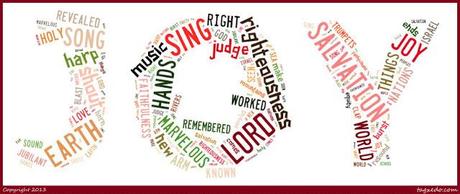listen to ‘Sing for joy’ on Audioboo

How can you command anyone to do anything with joy.
It is one of the great unobeyable commands of the bible - like the command to love or to be at peace. You may think that you have a chance of willing obedience, or of willing service, but you cannot will yourself to love, or be at peace or to have joy.
Joy is something that is bigger than us.We can induce temporary happiness: We can do that chemically. What is it that they say: ‘reality is an illusion created by lack of alcohol’? We can do things that we enjoy. But we cannot create joy.
Joy is a gift. We glimpse it in human events. - Great sporting moments (yes, Murray winning Wimbledon)- The birth of a child- Announcement of a long awaited engagement, or a great achievement
And we are also given glimpses of a deeper kind of joy: Peter writes, ‘Though you have not seen him, you love him; and even though you do not see him now, you believe in him and are filled with an inexpressible and glorious joy, for you are receiving the end result of your faith, the salvation of your souls’ (1 Peter 1:8) There can be moments when the eternal touches our soul, and we are filled with joy.
But joy cannot be created. Joy, like love and like peace, is a gift. But oddly, it is a commanded gift. Both the Old Testament and the New Testament command us to rejoice.
Psalm 98 can help us with this.
It gives us a threefold reason for joy
1. Because of God’s salvation
Verses 1 – 3 are all about God’s salvation.
It is a salvation that God himself has accomplished. ‘His right hand and his holy arm have worked salvation for him’ (Psalm 98:1)
The Psalmist is probably not thinking of a specific event. There are many acts of God’s salvation that the Jewish people witnessed.
In our first reading we heard some of the song that was sung after the defeat of the Canaanites at the hands of Deborah (Judges 5). The people had been crushed, and suddenly, unexpectedly, deliverance had come. But equally we could think of the Exodus, of Hezekiah when Jerusalem was surrounded by the forces of Sennacherib, of the return from exile.
And I trust that as Christians we can look back at times when God has intervened in our own church story or life story and rescued us – when we were out of our depth and God stepped in. But as Christians we do look back to a single significant saving act. We look back to those 33 years in history, when God rescued us from the power of sin and death, when Jesus Christ, the eternal Son of God, became a human being, lived among us, died on the cross for us and rose again.
And because of that one act, we are forgiven, we are set free from the power of sin, we do not need to be paralysed by the fear of death, we can have intimacy with God now and we have an eternal destiny.
It is what God alone has accomplished. It was all his work: ‘his right hand and his holy arm have worked salvation for him’.
When we were his enemies, God showed his love for us in this: he sent his Son to die for us – so that we, who were his enemies, might become his friends.
So we have grounds for rejoicing. Your salvation does not depend on you. It is not about how good you are, or how religious you are, or how sincere you are. If it depended on you, you would either be insufferably arrogant thinking that you deserved salvation, or you would be unbearably crushed realising you could never do enough. No. It is all about him and what he has done.
We were like spiders in the bath. We could not escape and our destiny was to be washed down the plughole. But the divine merciful hand reached down, scooped us up, and threw us out the window!
And not only has God accomplished this.
God has also – says the psalmist - made it known. ‘The Lord has made his salvation known’ (2)And v3: ‘All the ends of the earth have seen the salvation of our God’
We would not assume that a man dying on a cross was the way that God intervened to save us. But because of the prophets of the Old Testament, who taught about the cross, and because of the message of the New Testament writers who look back at the cross, we look at Jesus on the cross and we realize that through his death he has brought about God’s amazing act of salvation.
Jesus spoke about how that message, the story of his death and resurrection, the story of forgiveness and new life, would be taken to the ends of the earth by his messengers – that is you and me - before he returns.
2. Because of God’s righteousness‘The Lord has revealed his righteousness to the nations.’ (v2)
God’s righteousness, his right-ness, his right-way of being and his right way of doing – on other words, his nature - is revealed in his works of salvation. As we look at the cross, we see
- his love (‘He has remembered his love’ v3)In the OT he demonstrated his love by choosing a slave people to make them his people – to be a people in whom he delighted, for whom he had a destiny, and to whom he longed to be united. And we celebrate the steadfast love of the Lord, in choosing us, who were and are nobodies. He chose us and he died for us. He delights in us; he has a destiny for us – to transform us into the likeness of Jesus. And he longs that we are one with Him.
- his faithfulness (also v3)His faithfulness to his promises in the Bible; promises given to Abraham and Moses and DavidAnd Jesus really is the fulfilment of all of those promises. He is the fulfilment of the justice of God and the mercy of God. ‘Righteousness and peace kiss each other’ (Psalm 85:10)
- his kingship ‘God’ says the Psalmist ‘is King’ (v6).‘Jesus’, says the New Testament, is the Messiah, ‘God’s King reigning with God’s authority’And we can rejoice because it is Jesus Christ who died for us, who is the Son of God, who loves us, who is faithful to his word, and who is the ultimate ruler of creation.
So whatever happens in our lives - even if we find ourselves under extreme pressure, or in the darkest deepest pit – nothing is outside his control or his ability to save.
3. In anticipation of God’s judgementIt might sound odd to say that we rejoice in God’s judgment.
But the Psalm speaks of how creation itself rejoices in anticipation of God’s judgment ‘Let them [it is speaking of the rivers and mountains] sing before the Lord, for he comes to judge the earth’. (v9)
I wonder whether you have ever thought of the sounds of creation as being a song anticipating the divine judgment on this earth.
When you lie in bed in the morning and listen to the birds singing; or when you are out walking and hear the wind blowing through the leaves, or the rain falling or water bubbling in a brook, or even if you hear the scream of pain - hear it as a song: there are many kinds of song – a lament, a cry of longing or a song of joy in anticipation of divine justice when everything will be put right, made fair and brought together in harmony.
And we rejoice with creation in anticipation of judgement, because it will be a judgment that is on the basis of God’s righteousness.
And that means that God’s judgment will be based on his love, on his desire that we – who were his enemies – might become his friends, his lovers. His judgment will be based on how we have responded to that invitation
And his judgment will be based on faithfulness. Not our faithfulness to him, but his faithfulness to us. So we will be judged on our dependence on him who is utterly faithful. Are we living our lives trusting in his promises that, because of Jesus, we are forgiven, we do have the Holy Spirit, we are citizens of his kingdom and we do have an eternal hope?
And his judgment will be based on our willingness to serve him, the one who is King.
And one day this creation will be put right. That is why creation itself sings with joy.
I said at the beginning that we are unable to will ‘joy’. It is a gift, something that comes to us from beyond.The New Testament speaks of ‘love, joy and peace’ as fruits of the Holy Spirit – and as we walk with Jesus so those fruits will grow.
But there is something that we can do. And it is very simple.
We can be obedient to the command to sing.
‘Sing to the Lord a new song’ (v1)‘burst into jubilant song with music’ (v4)‘the rivers and mountains sing together for joy’ (v8)And there is also a little bit of shouting for joy!
Can I urge you to become people who sing? Not just in church, but even more so at home.
We’ve lost the art of singing. In the past, if you had a party, people would gather round and sing. Now we rarely do that - although karaoke has made a bit of a difference. I think, if we have parties, we’re going to try and get people singing.
We certainly don’t sing on our own.
But the command here is to sing, to sing a new song.
You may not have a voice, but if you are a Christian, you do have a song.
I’ve been urging people to put aside at least 15 minutes each day to spend with God. Could I suggest that as part of that time, you might sing a hymn or a song? It is much easier now that we have iPods or spotify or MP3’s: you can join in. For those of you who use WordLive, you will know that they offer a couple of songs for each day.
But don’t just listen to the songs. Join in yourself. Buy a copy of a song book. Become a people who sing – who sing of our God who saves, who is righteous and who will come in judgment.
I’ve tried doing it this week, and I think that it does help. I feel rotten or tired, there is so much to do (this week I have had three big talks to produce), may be you feel a million miles away from God. You certainly do not experience any joy. And then you start to sing of God and to God. And it does something. So I simply finish where the Psalmist starts: Sing to the Lord a new song, for he has done marvelous things.
One of St Augustine’s great prayers was the prayer, ‘O God, you command what you will. Give what you command’.God commands us to have joy – so we pray, ‘Give the joy that you command’.
And for those who live in him, trusting and obeying him (and that includes singing), he will give us now glimpses of joy, and on that final day, he will give us eternal joy.

